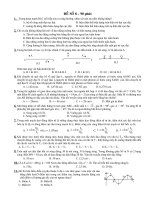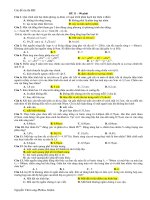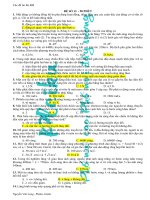ĐỀ THI THỬ ĐH – SỐ 12 doc
Bạn đang xem bản rút gọn của tài liệu. Xem và tải ngay bản đầy đủ của tài liệu tại đây (119.64 KB, 9 trang )
ĐỀ THI THỬ ĐH – SỐ 12
PART I: PHONETICS
Exercise I. Choose the word that has different pronunciation of the underlined letter.
Identify your answer by circling either A, B, C or D.
1. A.fat B. any
C. gas D. hat
2. A.weather B. there C.
math D. than
3. A. glad B. geography C. glasses
D. give
4. A. kitchen B. high
C. price D. like
5. A. bread B. cheap C. tea
D. season
6. A. help B. forget C.
intelligent D. believe
7. A. chop B. more C.
hot D. shopping
8. A. sugar B. sunny C.
school D. seafood
9. A. house B. history C.
help D. higher
10. A. well B. better C.
semester D. wet
PART II: VOCABULARY
Exercise II: Questions 11-20 are incomplete sentences. Choose from the
alternatives given ONE best way to complete each sentence by circling
the corresponding letter A, B, C, or D.
11. In a __________ lesson, students learn how substances react when being put
together.
A. maths B. chemistry C. literature
D. physics
12. __________ often visit famous places in London such as the Big Ben Tower, the
Thames, etc.
A. Workers B. Teachers C. Tourists
D. Directors
13. Difficult questions were given in the test to pick out the most __________ pupils in
the class.
A. intelligent B. graceful C. interesting
D. lazy
14. Every pupil has to __________ school regularly.
A. attend B. play truant C. visit
D. quit
15. Shop managers often categorize goods into different __________ in the
supermarket.
26
A. tables B. spaces C. piles
D. sections
16. A warm and __________ house is said to give the owner the feeling of relaxation.
A. interesting B. rich C. cheap
D. well-furnished
17. Make sure that you mix all __________ in a bowl before making the cake.
A. materials B. ingredients C. pieces
D. segments
18. Keep the meat in the __________ so that tomorrow we can have fresh meat to
cook.
A. cupboard B. oven C. fridge
D. box
19. Students often study harder when __________ for exams.
A. passing B. preparing C. sitting
D. taking
20. A: “This skirt does not seem to suit me”.
B: “Well! __________ it __________ and you’ll see”.
A. Try through B. Try up C. Try in
D. Try on
Exercise III: Questions 21-30 are incomplete sentences. Choose from the
alternatives given ONE best way to complete each sentence by circling
the corresponding letter A, B, C, or D.
21. The weather in __________ countries is generally hot and wet.
A. tropical B. rainy C.
mild D. extreme
22. The heavy rain caused __________ in many parts of the country.
A. droughts B. floods C. tides
D. downpour
23. The first episode of the TV __________ attracted a great number of audience.
A. news B. film
C. series D. talk
24. The __________ called Disneyland is the place where much of the entertainment is
connected with the Disney cartoon characters.
A. museum B. theme park C. gallery
D. theatre
25. Tom is now at the twelfth grade and he is going to take the university __________
exam.
A. entrance B. graduate C. bachelor
D. certificate
26. Wearing __________ is not compulsory in this university; therefore, students can
wear whatever clothes they want.
27
A. uniforms B. hats C.
shoes D. dress
27. In a shop you can use a credit card or you can pay in __________ .
A. money B. cash
C. coin D. bill
28. You can usually get cheaper goods if you buy them in an open-air __________.
A. store B. street C.
market D. shop
29. A large store may lose some of its stock as a result of theft or __________ .
A. robbery B. goodpicking C. insecurity
D. shoplifting
30. You can look for the instructions to cook this dish in a __________ book.
A. cookery B. recipe C.
meal D. menu
PART III: GRAMMAR
Exercise IV: Questions 31-40 are incomplete sentences. Choose from the
alternatives given ONE best way to complete each sentence by circling
the corresponding letter A, B, C, or D.
31. You should bring with you an umbrella if you want to go out now. It __________
at the moment.
A. is raining B. rains C. rained
D. will rain
32. In winter, most of the time the sun __________.
A. isn’t shining B. doesn’t shine C. didn’t shine
D. won’t shine
33. After the party, there wasn’t __________ left on the table.
A. something B. nothing C. anything
D. everything
34. She is so hungry that she can eat __________ .
A. something B. anything C. nothing
D. every
35. Mr. Minh has just sold his old car. He __________ a new one.
A. buys B. is going to buy C. will be buying
D. bought
36. My bicycle __________ down yesterday so I have to take the bus to school today.
A. breaks B. break C. is
breaking D. broke
37. Boys often learn Mathematics __________ than girls.
A. better B. good C. best
D. well
38. Lan can speak English very __________ because she practices every day.
28
A. better B. good C. best
D. well
39. When Fred went shopping yesterday, he __________ a lot of potatoes and eggs.
A. buy B. is buying C. buys
D. bought
40. When Mary was at high school, she __________ hamburgers and coffee for lunch.
A. would have B. was having C. had
D. has had
Exercise V: In each of the following sentences, one of the four underlined
parts is not grammatically correct. Find that mistake. Circle A, B, C
or D to identify your answer.
41. Now, his son can read fast than other members in his group.
A B
C D
42. My mother is a famous singer and she can sing very good.
A B C
D
43. How is the weather like in Vietnam in summer?
A B C D
44. His house is much far from the centre than mine.
A B C D
45. Last year, Mary can’t do sums as quickly as she can this year.
A B C D
46. Watching television is much interesting than listening to the radio.
A
B C D
47. According to the salesperson, Nescafe is very good as ground coffee.
A B
C D
48. Lan is a newcomer so she doesn’t know nobody in the class.
A B C D
49. She dances more graceful than most of the girls at the party.
A B C
D
50. Let’s to go to the theatre and see the latest play.
A B C D
Exercise VI: Questions 51 - 60 are incomplete sentences. Choose from the
alternatives given one best way to complete each sentence by circling
the corresponding letter A, B, C, or D.
51. Autumn is the __________ season in a year.
29
A. more beautiful B. most beautiful C. beautiful
D. beautifully
52. He works __________ but he __________ earns enough money to support his
family.
A. hardly/hardly B. hard/hard C.
hardly/hard D. hard/hardly
53. There’s __________ at the door. Can you go and see who it is?
A. nobody B. anybody C.
somebody D. everybody
54. If you work harder, you __________ better.
A. will learn B. are learning C. are
going to learn D. learnt
55. She can type as __________ as an experienced typist.
A. quickly B. quick
C. quicker D. quicklier
56. Their parents give them a lot of money so that they can buy__________ they like.
A. something B. nothing C.
anything D. none
57. She has lived in Britain for five years so she speaks very __________ English.
A. well B. good
C. better D. best
58. Life in the countryside is __________ and __________ than life in cities.
A. more healthier/more peaceful B. healthy/peaceful
C. healthier/peacefuller D.
healthier/more peaceful
59. Don’t walk so__________. Can’t you walk __________?
A. fast/more slowly B.
fastly/more slowly
C. fast/more slow D.
fast/slowlier
60. When she was cooking dinner, she __________ her finger.
A. cuts B. cut C.
was cutting D. is cutting
Exercise VII: Choose the correct verb tense by circling the corresponding letter A,
B, C or D.
61. Jane (take) the bus to work every day. She usually (wait) for the bus at the corner of
this street.
A. take/ wait B. takes/waits C. take/waits
D. takes/wait
62. Why (you/wear) your coat today? It’s very warm and sunny.
30
A. are you wearing B. do you wears
C. will you wear D. are you
going to wear
63. Yesterday afternoon, Susan (go) to the supermarket and (buy) a chicken and some
cooking oil.
A. goes/buys B. went/buyed C. went/bought
D. goed/buyed
64. The department store (open) at 9.00 and (close) at 18.30 every day.
A. opens/closes B. open/close C. opens/close
D. open/closes
65. Look at those black clouds. It (rain).
A. rain B. is going to rain C. will rain
D. rains
66. Excuse me, I (look) for a telephone box. Is there one near here?
A. look B. will look C. looked
D. am looking
67. A: What are all these eggs for? You (cook) the omelette?
B: No, I (boil) them.
A. Do you cook/boil B. Will you cook/will boil
C. Are you cooking/am boiling D. Are you going to cook/am going to boil
68. A: What (you/do)?
B: I’m an electrical engineer.
A. do you do B. are you doing C. are you going to do
D. will you do
69. The river Nile (be) the longest river in the world.
A. will be B. was C. is
D. is going to be
70. According to the weather forecast, it (rain) tomorrow.
A. rains B. is raining C. will rain
D. is going to rain
PART IV: READING
Exercise VIII: The following passage has some blanks. Find ONE suitable word to
fill in each blank. Circle A, B, C or D to identify your answer.
Exercise is one of the best ways of keeping fit. It improves your body and mind and
enables you to perform (71) __________ in the work place and at home.
Proper breathing is essential if you want to get the (72) __________ from exercise and
you should also take into account your heart rate. It can be (73) __________ to do too
much at one time. That is why all good fitness instructors emphasize the importance of
“listening to your body”.
31
When you first start, you should use good judgments. It is easy to make mistakes of
using the equipment incorrectly or doing too much at one time. (74) __________
slowly and build up gradually.
To increase your fitness (75) __________ you should exercise for 20 minutes a day, 4
to 6 times a week. Then you will see a difference both in your body and your mind in
only a few weeks.
71. A. good B. badly C. better
D. worse
72. A. less B. most C. more
D. much
73. A. harm B. harmless C. harmfully
D. harmful
74. A. Start B. Starting C. Starts
D. Started
75. A. steadily B. badly C. wrongly
D. difficultly
Exercisse IX: Read the following passage and use the information provided in the
passage to decide which word or phrase A, B, C or D that best
describes London.
The majority of London’s inhabitants live in its suburbs. Many of them travel to the
city to work every day by train, bus, tube or car. These people are called “commuters”.
Commuters may spend as much as two hours every morning getting to work and
another two hours getting home again. The cost of living in London is higher than that
in most other parts of Britain. Millions of visitors come to London every year from all
over the world to see the famous sights here such as Buckingham Palace and many
other historic buildings. London is also very famous for its theatres, red buses and black
taxis. Some people find it a noisy and dirty place but it has many large, pleasant parks.
Here, everyone can enjoy some peaceful and quiet moments. London has many
attractions both for people from other parts of Britain and people from overseas.
76. In London __________
A. more people live in the suburbs than in the city center.
B. most people live in the suburbs than in the city center.
C. less people live in the suburbs than in the city center.
D. many people live in the suburbs than in the city center.
77. Commuters __________
A. live in the city center.
B. live in the suburbs and travel to work in the city.
C. live in the suburbs and work there.
D. live in the city center and work there.
78. Living in London is __________
A. cheaper than in most other parts of Britain.
32
B. more expensive than in most other parts of Britain.
C. most expensive than in most other parts of Britain.
D. more cheap than in most other parts of Britain.
79. London is famous for__________
A. its delicious food. C. its
theatres, red buses and black taxis.
B. its theatres but not for its red buses. D. its inhabitants.
80. The attractions of London are __________
A. for the Londoners only.
B. only for people from other parts in Britain.
C. just for foreigners.
D. both for foreigners and for people from other parts in Britain.
PART IV: WRITING
Exercise X: The words in the original sentence have been rearranged. Choose
from the alternatives A, B, C, and D the ONE best way to rearrange
the words to make a meaningful sentence. Identify your answer by
circling the corresponding letter A, B, C, or D.
80. to/school/homework/or/do/at/I/don’t/have/weekend/to/go.
A. I don’t go to school or do to have homework at weekend.
B. I don’t have to go to school or do homework at weekend.
C. I don’t have to go to school at weekend or do homework.
D. At weekend I don’t have school to go or homework to do.
81. I/on/music/always/MTV/Asia/Saturday/channel/o’clock/watch/every/at/9.
A. I always watch MTV Asia on channel music at 9 o’clock every Saturday.
B. I watch always MTV Asia on channel music at 9 o’clock every Saturday.
C. I always watch every MTV Asia on music channel at 9 o’clock Saturday.
D. I always watch MTV Asia on music channel at 9 o’clock every Saturday.
82. she/beautifully/friend/dances/than/her/more/much.
A. She dances much more beautifully than her friend.
B. She dances much beautifully more than her friend.
C. She dances more beautifully much than her friend.
D. She dances beautifully much more than her friend.
83. than/I/better/today/I/did/last/feel/much/week.
A. I feel much better today than I did last week.
B. I feel much better last week than I did today.
C. I feel better today much than I did last week.
D. I did feel much better today than I last week.
84. professor/Hanh/are/never/lectures/that/gives/interesting/his/such/classes/boring.
A. Professor Hanh gives interesting lectures such that his classes are never boring.
B. Professor Hanh gives such interesting lectures that his classes are never boring.
C. Professor Hanh gives interesting lectures that his classes are never such boring.
33
D. Professor Hanh gives interesting such lectures that his classes are never boring.
85. delicious/ice/time/cream/have/I/this/is/most/had/for/the/a/long.
A. This is the ice cream most delicious I have had for a long time.
B. This is the ice cream most delicious for a long time I have had.
C. This is the most delicious ice cream I have had for a long time.
D. I have had for a long time this is the most delicious ice cream.
86. but/usually/morning/I/woke/this/at/7:30/I /up/wake/earlier/up.
A. I woke up at 7:30, but I usually wake up earlier this morning.
B. This morning I wake up at 7:30, but I usually woke up earlier.
C. This morning I usually woke up at 7:30, but I wake up earlier.
D. I usually wake up earlier but this morning I woke up at 7:30.
87. records/Vinh/as/many/now/as/I /had/last/has/half/year.
A. Vinh has as half many records now as I had last year.
B. Vinh has as many records now as I had half last year.
C. Vinh has half as many records now as I had last year.
D. Vinh has as many half records now as I had last year.
88. not/as/it/last/because/there/winter/is/winter/cold/as/is/no/snow/this/.
A. It is not as cold as this winter because last winter there is no snow.
B. It is no snow there because this winter is not as cold as last winter.
C. There is not snow this winter because it is no as cold as last winter.
D. There is no snow this winter because it is not as cold as last winter.
89. he/English/speaks/fluently/Spanish/much/than/he/more/does.
A. He speaks English much more fluently than he does Spanish.
B. He speaks English more fluently much than he does Spanish.
C. He does English much more fluently than he speaks Spanish.
D. He speaks English much fluently more than he does Spanish.









